#Morimyu op 3
Text
I am absolutely bursting at the seams to scream about Morimyu Op 3.
Wanna write a very structured, intelligent analysis post but I don’t even know where to begin. Just … all of it.
— incoherent rambling about Moriarty the Musical Op 3 in-coming so quick — scroll if you don’t wanna see!
The way William’s yearning is portrayed. And Sherlock’s frustration. All the little references to Sherlock being a puppet on William’s strings. The way William is so infuriating and yet heartbreaking in the same breath. I totally get what Shogo meant when he once said, ‘it would be nice if William could be honest.’
The songs.
Spinning Around the Rondo? That entire spectacle. The lyrics, but also the way William steers and manoeuvres Sherlock at his whim … and the fact that they’re dancing with one another. I just. The metaphors. It was everything I needed from them.
I also love how we see the theme of the scarlet thread connecting them — this idea that they’re both attached but William is the one literally ‘pulling the strings’ — again in the scene with the Jack the Ripper culprits murdered. William tugging on an invisible string as he leaves and Sherlock immediately turning up to investigate. Chills.
In This Lonely Room I think is my favourite song from all 5 Opuses. When I say my jaw hit the floor … the dialogue from Albert beforehand — “you seem quite taken with him” ????? Umm. Okay. So it’s not just us then 😂 WILLIAM. You have been perceived 👀
And Shogo’s perfect called-out expression. But the pain in his eyes like … he doesn’t want to be made to face reality. He was having fun with his own little delusions and fixation with Sherlock. He was living in happy denial. Why do you have to go and be all voice of reason and ruin it, Albert?? “It will only hurt you.” EXCUSE ME is this advice on dealing with an unhealthy crush from your older brother time? I DIED.
But anyway. The song. Oh god, the song. Shogo sang it so beautifully and emotionally it made my soul ache for William and he’s like … he’s got this little glimmer of hope in Sherlock and when he LIES ON THE SOFA and sings TO HIS HAND LIKE A LOVER and then CLUTCHES IT TO HIS HEART. I cannot. Breathe.
What were they thinking? HOW can anyone be normal about them after witnessing that?
All of the songs in the second half pretty much ended me, to be honest.
I’m not sure how many times two people need to sing about having each other in their hearts to get the message across. I heard it the first time. And the second. And the third. BOYS PLEASE I UNDERSTAND don’t make it hurt more.
And then … the Durham date? THE DURHAM DATE!?
Ryo’s acting here was so good. The range of emotions he goes through during his talks with William — from notice me senpai to omfg challenge accepted to oh god we just sang about changing the world together do we really have to return to the weighty matter of why I came here — the LOC — after that? To oh shit you really do want someone to stop you to actually the RELIEF because that means you are a good person underneath it all if it’s really you — and I hope it is because I want you to be as obsessed with me as I am with you.
WILLIAM’S SHERLOCK AFTER HE LEAVES? The way he smiles so full it’s visible even with the dimming lights.
And then the final song … the repetition and switching of ‘I hope’ and ‘I will.’
I now fully understand why Morimyu twitter cannot stop saying those phrases and I am fully with everyone because ever since watching Op 2 they have been echoing in my mind but NOW — now I feel them in my bones like a bloody mantra.
Yes, I am dramatic about this. What of it?
😂😭🥹🤦🏼♀️
(Not even gonna start on Op 4 because that also broke me in very specific ways but it still comes in hard second to Op 3 my love.)
#this is why it has taken me so long to finish Ever Ours ch.3#but I hope my writing is the better for it 🤞🏻🤞🏻#morimyu#Morimyu op 3#moriarty the patriot#yuumori#Moriarty the patriot the musical#Yuumori the musical#yuukoku no moriarty#william moriarty#sherlock holmes
27 notes
·
View notes
Text
(Sorry my Op.5 hype is off the charts: super long post up ahead with a bit of analysis into why Sherlock says the things he does to convince William to live)
Can I just say that Morimyu Op. 3 does a fantastic job at setting up the confrontation between William and Sherlock?
William sings, conflicted, about whether he can still find forgiveness. His mind is set on dying (alone), but there's a part of his heart that wavers.
AND THEN. AND THEN!!!!! SHERLOCK MEETS HIM IN DURHAM AND TELLS HIM
A crime is still a crime, no matter how noble the intention. He cannot forgive killing others and using the deaths of people, even despicable people. (Which is beautifully contrasted against the Jack the Ripper case btw). He will catch the Lord of Crime and punish him for his actions.
It's at that point that William turns a bit sorrowful and resigned (and Shogo's expression is so!!!! SO!!!!! wow his despair is palpable) almost as if he's thinking to himself 'as expected, there is no forgiveness for someone like me' and probably solidifies his idea that death is the only suitable recompense for him.
--
ANYWAY back to the manga itself

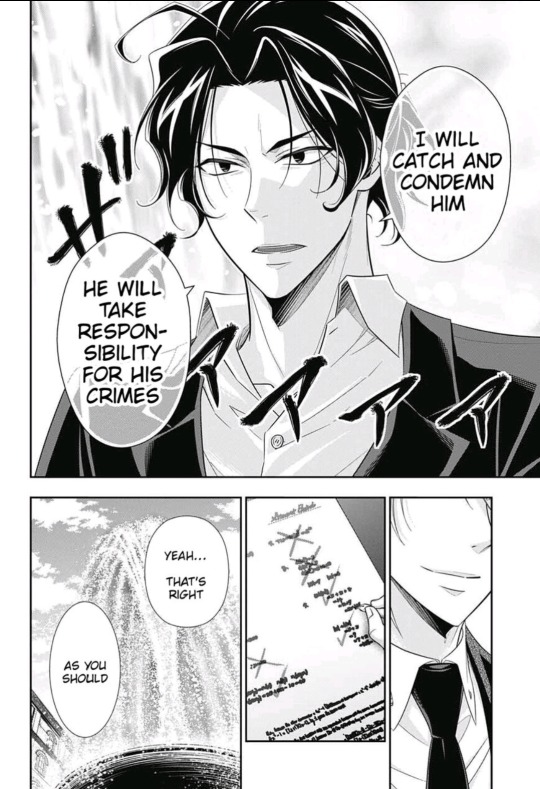
His sorrowful condemnation:

I think that it's precisely because of this, the only person whose forgiveness can change his mind is Sherlock.
It doesn't matter that Fred or Louis or what any others think. They can call him a good person all they want, but it doesn't change the fact that in his mind, he is already condemned.
(Besides that, his accomplices are all evil because their plan is inherently evil to him. Their words hold little weight. A sinner can't save another.)

That is, until Sherlock tells him this.
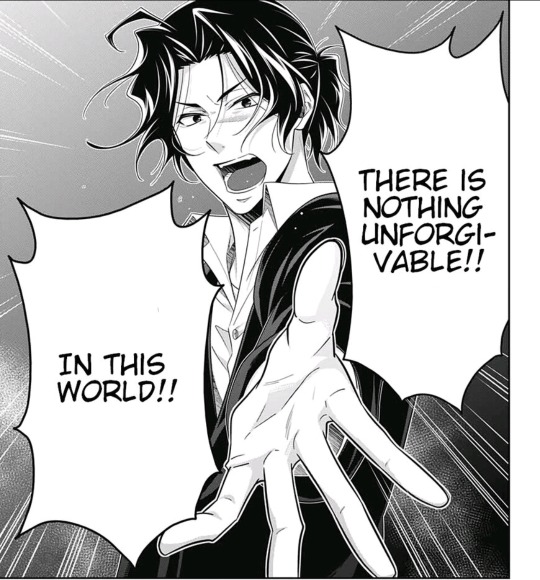
And suddenly his entire worldview is upended. Because all this time, he believed there was only condemnation to be found for someone like him.
Sherlock, his righteous actor in the stage of London's crimes, has deemed him worthy of redemption.
And if the one good person thinks that William can be saved...
But no! How can believe that? William James Moriarty is the devil incarnate. He is stained. His sins are unforgivable, no matter what Sherlock says. Murder is unforgivable, right?
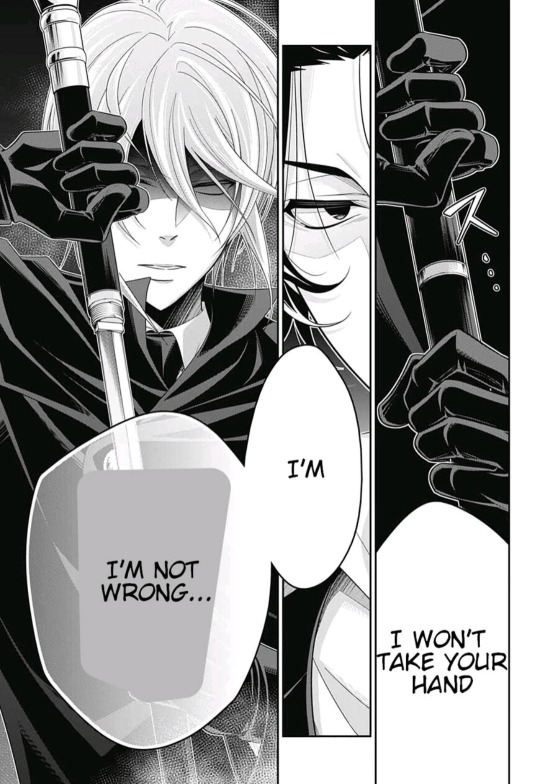
So Sherlock flips the script.
He reminds William that HE is also a criminal and murderer. (It's a perfect crime in the eyes of the law, but William knows the truth)
He becomes the mirror reflecting William's image so that William can come to the realisation that they are all capable of good and evil.
The greatest evil is capable of good.
The greatest good (Sherlock - in Liam's eyes, at least) is capable of evil.
And if William can still think of Sherlock as good despite this,
And if William can forgive Sherlock for murder...
Then why can't William himself be forgiven for murder?
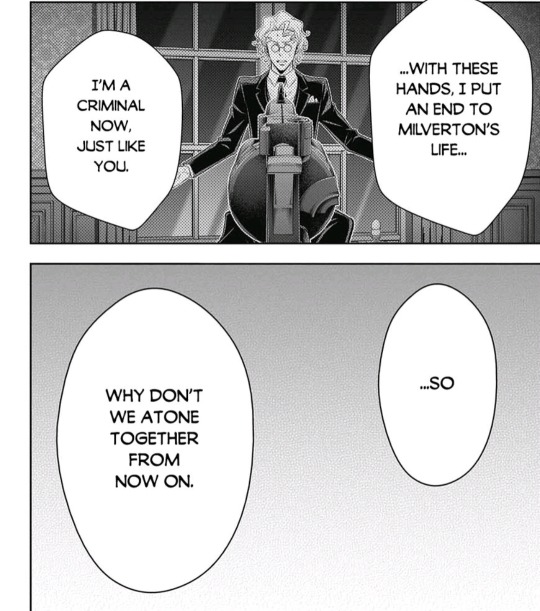
I think, in some ways, here Sherlock also confesses that he has lost the mandate or the right to catch William as a detective on the right side of the law.
He's not standing there as someone catching a criminal.
They're now standing as equals. Friends (or whatever you call that tension they have going on LOL), rivals, equals.
It's no longer "catch" in the criminal sense, but to "catch" a falling friend. A trust fall, if you will.
(It just occurred to me that the whole chapter is just a trust fall exercise on a large scale LMAO)
This changes the whole trajectory of what William believes in. That seed of doubt has been planted in him - that he could, perhaps, still find forgiveness.
More importantly, that he has Sherlock's forgiveness.
And that is what allows him to live on.
#yuukoku no moriarty#moriarty the patriot#sherliam#my writing#the thoughts are falling#sherlock holmes (mtp)#william james moriarty#just a bit of introspection#sparked by my obsession with morimyu#yes I recently rewatched op.3#the falling in my username actually stands for falling apart#which is exactly what is happening to me every time i think about sherliam#i fall apart
72 notes
·
View notes
Text
[Eng Subs DL] Musical Yuukoku no Moriarty (Moriarty the Patriot) Op. 4 - "The Two Criminals"
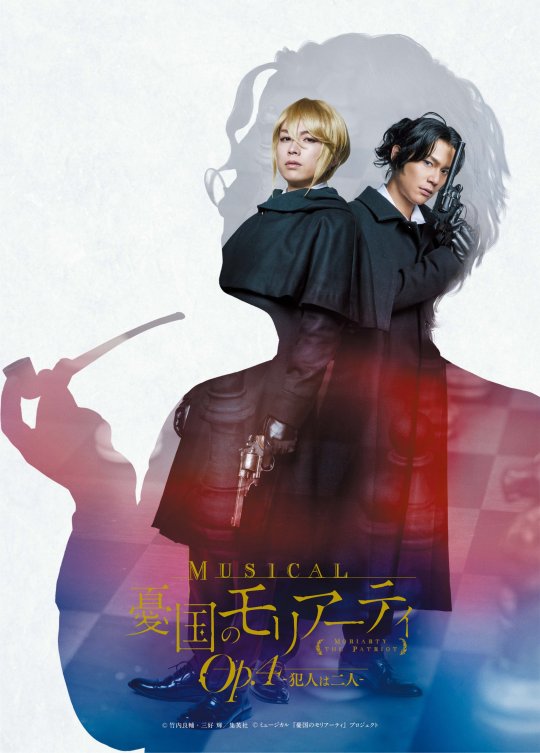
Hello, and Merry Christmas to those who celebrate~! Otherwise, Happy Holidays! I am here to share the English subtitles for more MoriMyu~!
Oh gosh, I apologize for such a long wait...!
Life just punched me around a bit with studying for board exams (which I passed, thankfully!), a bit of technical problems with the BD version, and a lot of real life things I needed to take care of before the year ends ( ̄▽ ̄*)ゞ
Op. 4 covers chapters 33-47 of the original comic, with a few scenes/moments omitted. It is essentially the build-up to the climax of the story that was covered in Op. 5!
We were also blessed with the addition of Miss Mary Morstan and Adam Whiteley for this musical, and I hope everyone falls in love with them, too~!
Anyway, here are the subs~! A huge, huge thank you to @mouldering for helping me with proof-reading and quality checking! I wouldn't have been able to finish this before Christmas without your help~!
♡ ~('▽^人)
I will be updating the folders with the bonus content subtitles when I am able to as well, but for now, please enjoy the main show's subs~!
Links, notes, and disclaimers under the cut, enjoy~!
BD PURCHASE LINK (International cards and shipping accepted!): CDJapan - BD ver. | DVD ver.
Official Sites: Twitter | Website (MoriMyu General) | Website (Op. 4)
MoriMyu Op. 1 Subtitles | MoriMyu Op. 2 Subtitles | MoriMyu Op. 3 Subtitles
NOTES:
※ THE FILE IS SUBTITLES ONLY, VIDEO IS NOT INCLUDED!
※ The folder contains subs for a DVD version as well as a Blu-ray version!
(I tested the DVD version on the BD a lot of times, and there was always a slight delay with the syncing, so I re-timed and re-styled it for the BD. You could technically load the DVD subs onto the BD, but you'd have to manually adjust the timing on your media player.)
All songs and lyrics were translated by me.
A bit of creative liberty was exercised to fit context and some cultural references.
As usual, the lyrics actually help move the plot, so I didn’t include the romaji for any of them. But, if you’d like to have the complete lyrics, I do have them saved up in PDF form, so feel free to DM me for them if you want ^^
Again, I’m not a native British English speaker, so some terms might be off. I consulted with a friend to help me check them, just in case, but please forgive any mistakes.
As usual, some scenes in the musical differ from the anime/manga for time and fluidity’s sake, so please don’t hit me for things that I can’t control ^^;
There aren’t particularly any triggering scenes here, but please do watch with caution since some subjects and terms used might be sensitive and/or triggering for other viewers.
@kumoriyami-xiuzhen requested me to do the bonus content subs, so I will be reblogging and updating the main post when they are up as well! ^^
RULES:
[MOST IMPORTANT] Please DO NOT re-post the subs and the link outside of Tumblr! If you want to share outside, please, please DM me about it and link my blog to your post. That’s all I ask.
Please DO NOT remove my credits.
Please DO NOT re-translate without permission.
SUBS DL LINK: GOOGLE DRIVE
※ Please only DM me if there is a problem with the subtitles. I cannot help you if it’s related to the videos.
※ If you enjoyed my work, please consider buying me a coffee here, if you can. It’ll really help me out a lot.(o^▽^o) Thank you!!
#yuukoku no moriarty#moriarty the patriot#musical yuukoku no moriarty#moriarty the patriot musical#morimyu#suzuki shogo#hirano ryo#kubota hidetoshi#yamamoto ikkei#kamakari kenta#nagae ryoki#izawa yuuki#takagi shun#fujita ray#nanaki kanon#yuukoku no moriarty translations#my subs#my translations#i still get goosebumps whenever i watch the songs in op. 4...!#they are so powerful and so packed with emotion...!#“i hope” and “i will” still make me so weak!!
200 notes
·
View notes
Text
Morimyu Extras Translation Commission Group Order?
If anyone has ever enjoyed the Morimyu backstage extras, like the Op.3 adlibs where Louis drops a knife and terrifies Moran, there are a number of people from the Save our Twisted Hearts Discord group, including myself, looking to fund translation commissions to have subtitles for a bunch of non-main stage Op.5 and Op.2 extras content by pooling our monetary resources together, as they rarely get translated otherwise, regardless of the fandom.
To be very clear, contributing is not mandatory to access subtitles of any of the extras (I generally use this term or "extras content" to refer to Disc 2 of any stage Blu-ray or DVD, but also other content that is not included on the main stage disc), and the groups orders we have made have already been used to help fund translations for the Op.1 extras, and most of the extras content for Op.3 and Op.4 (the subtitles for Op.1 and Op.3's extras are available on Kanasmusing's postings for Morimyu subtitles!). Beyond that, I funded the commission for the translation and subtitles of the Op.3 adlibs and a few Hakumyu backstages and I have always made all the associated media accessible to anyone who wanted it... just in case anyone needs proof of us having paid for translations of Morimyu content before.
Anyway, at the moment, assuming nothing happens, we collectively have enough funds to pay for translations and subtitles of most of Op.5's non-main stage content (this includes things like the adlibs and cast comments from Disc 2 of the Op.5 Blu-ray/DVD, the bonus team videos that came with the purchase of the streams on DMM, and the pre-order bonus DVD, though this does not include videos that are purely songs)... and are fairly close to gathering enough commitments to fund almost most of Op.2's main extras disc (this would be disc 2 of the Blu-ray/DVD), though we could possibly instead fund a commission to get translations for the Op.2 pre-order DVD bonus (we can do almost one or the other, but not both).
Given this situation, and how close we are to funding the Op.2 backstage (our general preference is to pay for translations of the more costly content first), I would like to ask if anyone has an interest in contributing to our next translation commission for Op.5 and Op.2's non main stage content... and that they please message me directly for more details, preferably ASAP, if they do.
16 notes
·
View notes
Text
Old doodle I made back then after watching Morimyu Op 3 the first time (that was the first Yuumori musical I saw and ever since, I sing Devourer of Souls in the bath... but My Happiness is also fire)
Milverton would also totally sing in the bath.

My Happiness lyrics translation: Let me devour your souls! Submit yourselves to me!
Milverton: Wait, I actually have a great voice! Need to make good use of it!
Milverton (in the bath): Oh, oooh, the misery! Everybody wants to be my eneeeemy!
9 notes
·
View notes
Note
Hello~ Just wanted to thank you for sharing the lyrics + translations for the songs!! I just discovered morimu not long ago and I'm super in love with the songs ^^ I do hope they'll release an album for Op. 4 too... I unfortunately do not own a BD player so I had to buy the DVD versions but they're still super good T^T Super hyped for Op. 5 XD
Hello!!!!!! Apologies I'm 3 months late replying alskrjalsrkj I'm so happy you found morimyu!!!! Isn't it just one of the best musicals ever?? Gosh. The songs are just so good. It isn't even just the lyrics, even the melody is just godly. Plus, the cast's voices?? HUHUHU There is just nothing to complain about.
And good on you!! Supporting the show by buying the DVD. <3 Every little bit helps a long way, I believe. AND YES. OP5 HYPE IS REAL.
Have a lovely rest of your week!
-Miso
8 notes
·
View notes
Text
Thanks for the tag @user-needs-new-hyperfixation
Last Song Listened To: Morimyu Op. 1’s theme
Currently Watching: Morimyu 1 (rewatching technically since I finished 1-3 and now I’m accustomed to the actors so I can focus on the DETAILS)
Currently Reading: rereading Thick as Thieves by Megan Whalen Turner
Current Obsession: to the surprise of no one, it’s Moriarty the Patriot
Tagging @eternallaughter @hergan416
2 notes
·
View notes
Text
[Morimyu Op. 3] Fighting scene Piano
I had the chance to project Morimyu onto my TV so why not take this chance and try playing along with the music?
So it's not entirely a "cover" but just playing along with the background music in the scene, and this is the first take with no practice so the timing at the end wasn't perfect
But it was a fun experiment?
And I did try playing along Liam's solo Kokoro no Heya, Kokoro no Rondo, Lestrade's puppetshow, the opening and (lol) literally any song that I can work out the chords on the spot without having to arrange another entire sheet, but having the musical running alongside while playing the piano part is just extraordinary
And a lot of fun lol
#musical yuukoku no moriarty#morimyu#morimyu op 3#jack the ripper and their fighting scene#and all the music#is just extraordinary
10 notes
·
View notes
Text
Sherliam-shaped ramble incoming 🥴🥺
Rewatched Morimyu op. 3 for the millionth time and can’t stop thinking about Albert’s words to William about leaving the real Jack The Ripper culprits’ bodies there for Sherlock to find, and how much trust William had in this man despite only having met him a handful of times.
Like he really said ‘you and I are on the same wavelength to the point that I trust you not to fuck up this whole scheme to unite the current discord in London between Whitechapel and the Yard without even exchanging an actual word with you on the subject.’
He must have really felt so … vindicated to have found someone who could take one look at his actions and piece together his real motivations behind his criminal acts. Sherlock quickly paints the Lord of Crime as a ‘Robin Hood’ figure who’s seeking to rebalance their world, and although he can’t forgive the law-breaking methods employed by Liam, he recognises that Liam took on that role and condemned himself for the sake of the common people.
William found someone who could identify the real heart of him, and then he trusted that person with his life — to carry out the real justice to balance out his wrong-doings.
You know, the more I think about it, the more it hurts and the more I love Sherlock. I think for William, the answer to Sherlock’s ‘why me?’ (Why not a perfect actor instead?) is that an actor might see William’s acts but not really understand them in the way Sherlock does, or care to, and that is incredibly important to William.
William knew he had to die because what he was doing was passing judgement in a way he shouldn’t really be allowed to do, in a fair and righteous world, but he has to do it that way in order to make an impact and affect change. But at least let the person who ends his life truly understand why they’re doing it — not because William is rotten and hateful at his core, but actually, filled with love and compassion for others, so much so that he’s willing to become the villain for everyone else’s sake.
I believe it was the last comfort he could hope for — to have his act, his show, his existence brought to an end by an individual who would not hate him or misunderstand him as they ‘pull the trigger.’
He called Sherlock ‘the real devil!’ angrily in their final (and only) fight on the bridge because Sherlock hesitated, and William’s hard-wired view of his own guilt pushed him to think that Sherlock’s moral compass might suddenly be off, and he lacked the conviction to condemn William to death as William believed should be the just and moral end to his plan.
But then he realises that actually, it’s not that Sherlock is weak hearted and unwilling to follow through with the path of justice. What William has underestimated is Sherlock’s own depth of compassion — but compassion for him, specifically. In all his planning, even in his joy at finding Sherlock — a man who would understand his goal and dream and what it might take to bring it to fruition — William had failed to account for the possibility that someone might be moved enough by his sacrifice to want to save him.
The idea that he is as deserving of love as everyone else is not a thought he’s allowed himself to entertain, and he steels his resolve and decides that he will jump himself if Sherlock cannot do it.
But this idea that Liam is an individual hugely deserving of love has been at the forefront of Sherlock’s mind for a long, long time before they faced off on that bridge.
Sherlock sees the role William has taken on — completely by himself. He understands the lonely truth of William’s compassionate and self sacrificing nature beneath the facade, and to this he says, I’m here, I am your friend, and I won’t let you do this by yourself anymore. I won’t let you fall alone.

They are just. Everything. The love is like a physical weight on my chest, I cannot. 😭
#sherliam#yuukoku no moriarty#william james moriarty#mtp sherlock#sherlock holmes#yuumori#moriarty the patriot#morimyu#morimu
83 notes
·
View notes
Text
Morimyu in Classical reference
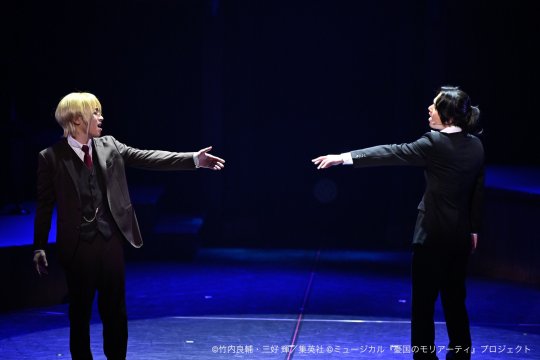
So, as for the fact that music in Morimyu Op. 3 resembles classical music in both progression and musical technicality, it's interesting how it's possible to keep coming up with different interpretations after re-watching the musical again and again.
I've made a thread on twitter about this before, but 1) word limitations and thread will never be enough to list all that I have to say lol 2) I'd prefer to have a fuller version noted down, especially one that I can edit and keep coming back over and over again when ever I come up with something new.
Either way, I am still (lol) not a pro in music theory and music history as well. All that is written here are based on my very very basic knowledge on music as well as something that I've picked up (and discussed) with my friends after watching Op. 3.
What's the point of this?
Why is it important? Lol I always need this to keep myself from writing off-topic but anyways. Why do the music sound good (except for the fact that because it does lol), and what do they represent? Surely there must be, and there always are, other things that are implied not only through the lyrics but also the music, and the flow in general.
Apart from the lyrics and the lines, it's also quite interesting to have a close look at the music - melody and harmony itself - to see how they portray the stories.
Most importantly, the continuality. How did Morimyu manage to insert so many songs and still managing to connect them as a whole? And how did they use music to go beyond what's on the pages?
That's the most important thing about musicals - beyond the pages. We don't see stage or anime doing so very often, as they mainly focus on what's already there, bringing them to life as close as possible to how we imagine things might happen.
As for musical, they have the music. They have the arias and the songs. At some point, a character starts singing, and other characters followed suit. They have their very unique way of expressing the plot, and they have the orchestra, the arias where characters get their solo song, and the duets between characters with strong relationships, and the ensemble which emphasizes the plot, and so on.
A funny thing about duets in classical opera, they're often meant to show lovers' relationship because of the harmony but can also use opposition and all to show enemies' relationship. And in SherLiam's duet it's just both of them at the same time - thoughts connected while engaging in a chase, a hide and seek game of mystery. We'll go into that later.
Back to the topic. Morimyu follows the main plot strictly, but also uses their advantage with music to add all the side details that wasn't told in the manga to create a "complete" view of the plot. It is always available for musicals to do something unexpected (like how we never expected Lestrade's puppet show to be a whole 5 mins long piece lol). And where they did that they added arias and duets, they allowed moments where characters express and developed their emotions as well as going with the plan (yes Albert yessss). Of course there's both a good and bad side to this all the while.
💛 The good thing is they went all the way to show us sides of emotions that we don't see much in the manga or stage, the sides of the story that all of them have kept hidden while focusing on their grand plan.
💛 But then it does get too emotional at some point, especially those who came for the plot and the mind games behind all of it (like me - although I won't deny that I had a lot of fun picking out all the emotions behind the music here lol).
Musicals can always go beyond what we knew. As for Morimyu, their music is heavily influenced by opera and classical music, and it's shown quite clear. There is live music playing (instead of the entire orchestra we have a violin and piano duet), and they have distinctive arias and recitatives throughout.
So thanks to that, it's also possible to use a reference from classical music to interpret their songs.
A Sonata formation - The Narrative Series of SherLiam
Yes, songs arranged and analysed with reference to a Sonata formation, especially in the way they progress through the play.
Some notes before getting into the point
1 - Sonata = a piece of music consisting of several movements - very often 3, sometimes 4.
First movement-Allegro: With the quick tempo, introducing the theme of the entire Sonata
Second movement-Adagio/Largo: Slow tempo, can be emotional sometimes, as well as leading more towards the final movement
Third movement-Rondo Vivace: The ending, quick-paced and vigorous, leading the Sonata to a close.
A Sonata always has a general theme, a topic. The theme that I chose to write about is Mystery - the Hide and Seek game between the Detective and Lord of Crime
2 - Aria and Recitative = different types of songs used in an opera
Recitative: Lines within a song that happens like a real conversation, as the characters sing they are also talking to each other
Aria: A solo section where everything else is a freeze frame, while one actor remains and sing their own song about their thoughts, feelings, etc.
In this post we're mainly discussing the arias of Sherlock and Liam, and the duet between them. But there's also some mention of recitatives here and there.
3 - Videos used
To make it easier to understand which songs I'm talking about, I also arranged them in piano. And also to have a listen at how they might connect.
Just in case the videos beneath don't work (they didn't work on my phone), the three songs discussed are Nazo, Liam's solo, Kokoro no Rondo, all piano arrangements.
All of the songs noted in this section are arias and duets from Op. 3 - the Ghost of the Whitechapel. The additional "series" that Morimyu has added spreading throughout the play, Sherlock and Liam's narratives, which portrays both their emotions and the chase between the detective and the Lord of Crime.
First Movement - Allegro: Nazo(謎) song
youtube
Starting from Lestrade's exit after his puppetshow and proceed to the scene, Sherlock's aria introduces the theme of the imaginary hide and seek game that the Lord of Crime has started. The song repeats the word (mystery) over and over again with a continuous rhythm.
Ends with Sherlock just mumbling the word Nazo (mystery) and exiting the stage - no conclusions, just like a mystery that leads into further mysteries with no answer.
♛♛♛ In regards to a Sonata formation, this is the beginning of the entire piece. Quick in tempo, written in 3/4 time and introduces the theme of the entire piece - Mystery.
Uso ka Shinjitsu ka - Lie or Truth song
Starting after Sherlock learns the truth behind Jack the Ripper, wondering if Lord of Crime is a good person after all.
Now I had a really hard time thinking whether this piece should be included or not. For one, it's not an aria.
It can be viewed as a Da capo Aria, a development section of the Nazo song, repeating the theme that is introduced, coming and going rather quickly. So, for continuality.
It also does not fit into the series as a whole, being
1) a recitative. The lyrics focus entirely on Sherlock's deduction and whether he should expose the truth or not, etc. so on.
2) The lines in here, unlike the other arias, are taken directly from the manga, so it's not entirely an 'added' element to this chase.
3) Also because if we compare this to a Sonata form, this doesn't really fit anywhere
However, among Sherlock's arias, this song can also be seen as an interesting development as I have mentioned above, so I've decided to have it here, still.
There's another thing about almost all of Sherlock's arias throughout the 2 stages - they never have a conclusive end. The detective's mind is always running, mysteries after mysteries.
Most of the other characters' songs ends with some kind of closing lines, and piano continues to conclude the piece with a strong end, and then goes on to start another piece. All of their problems in the songs are concluded. They made up their minds in some ways.
But Sherlock, his songs always end with him repeating the melody, a capella, and exiting the stage. Piano waits for him to exit, then starts a new song. Or in Op. 2's Mindgame case going straight into the next conversation. We never get to know how Sherlock's songs end, because they didn't really end at those points. There's a hanging sense of waiting for a resolution, a conclusion. Sherlock never seems to have his problems solved within the songs, they just go on and on.
An idea initiates, then something happens and he is once again in the dark. And he spins around within his own mind.

Screenshot from Op. 2. Even if we look back to his aria Mindgames from Op. 2, this song doesn't really have a conclusive ending as well. He just starts singing, the music stops and he starts shooting and going on, resuming the play. It kind of has been a thing for Sherlock's arias?
Second Movement - Adagio/Largo: Liam's solo
youtube
♛♛♛ The "second movement" - the 'slower' piece - of the series, Liam's aria lol but actually the piano part of this song isn't slow at all but ok. The other side of this hide and seek game. The "development" section of the sonata series, where we see things in a much more emotional way.
This aria is much richer in harmony and melody. Not only Liam's melody, but also the piano's part which plays a beautiful melody in harmony.
I recall an interview where the stage director mentions how the "orchestra" - piano and violin are representations for Liam and Sherlock. It kind of applies here, where his music is created mostly by piano.
There is modulation, emotions rising and elevating quickly and strongly. But the harmony is beautiful, overflowing and rich with emotions. The song repeats certain lines, emphasizing aspects within Liam's thoughts.
Unlike Sherlock's train of thoughts that circles with no destination, Liam's solo has a definite ending in harmony -> Even with all his emotions in mind, Liam still has a goal already set before him. He has a brief moment of slowing down, pausing and sung about his feeling, before resuming the story.
Leading us to the final stage - Kokoro no Rondo.
Third Movement - Rondo Vivace: Kokoro no Rondo
youtube
Rondo formation: Rondo is a type of dance that revolves around a pattern, often ABA, ABACA, or ABACABA - where A is the ritournello ("meguri - kimi ni omou - meguru kokoro no rondo" section) that is repeated over and over with B, C parts in between. Rondo can also be combined with sonata form - this case applies to this song which begins with a key other than the tonic (Fm) before resolving to the tonic key (Fm) to put an end to the entire sonata series.
For reference purposes, the last movement of Beethoven's Pathetique or the very typical Fur Elise is also written in a similar format. I also referred to Pathetique quite a lot when brainstorming this post.
♛♛♛ The "final movement" of this Sonata, the final scene of their "Hide and Seek" game. The song's tempo is vibrant and rapid, combining with the dancing sense, all the while strictly following the structure of a Rondo as mentioned above.
This is the stage where Liam and Sherlock's line interacts and reply to each other, as if in a real conversation - just like how the connection between them are now much stronger than what they had before.
In the ritournello, we have Liam and Sherlock's lines intertwining and chasing after one another, emphasizing the "Hide and Seek" element between the two of them.
The song comes to a definite ending, concluding with a strong tonic (Fm) chord. At this stage, there is no more question to be left open, for Sherlock at this point has already made up his mind to take the next step into solving the mysteries regarding the Lord of Crime.
Their imaginary game of Hide and Seek is coming to an end, as Sherlock came to a decision to take the next step - going to Durham.
That's the end of my first draft.
So far that is some of my thoughts noted down right after watching Op. 3 stream a while ago, with some edition made just now.
On the side note, at some point during my discussion with a friend, we also came up with the idea that a Suite may be a better reference. A Suite consists of 4 parts and a prelude, each of them having their specific characteristic. But we didn't go all the way analysing that idea, as
1) we couldn't find a 5th piece that can be added into the series.
2) Even if we did, the Truth or Lie song still would not really fit into the "aria" vibe of this series, as mentioned above.
But then quite interestingly, after a while, I've found another interesting fact that should have been quite obvious but I've missed for (lol) like ages.
The game of Hide and Seek between the detective and the Lord of Crime has begun ever since after Hope's case - that being said, ever since the end of Op. 1
And what is it that we have in Op. 2? "The Mind games of the Lord of Crime". The one where Sherlock went maniac rapping about all the thoughts he has and end up shooting randomly into the wall.
At first it begins like another recitative, but in the later half, the harmony starts to become more harmonious, written in 3/4 time flowing like a dance.
In that section, the melody of the piano and violin part resembles the one we have in Kokoro no Rondo, the Ritournello section, only that the melody of the violin in Op. 2 and the melody that SherLiam sung in Op. 3 are kind of reversed.
Coincidence much?
So now we have a collection of songs from both Opus, it becomes tricky. How do we connect them? And what's the story?
At this point, all these recitatives, aria and duets all in the theme of the Hide and Seek game. And they all connect to each other through harmony, progressions in harmony.
We know that the Mind games of the Lord of Crime has begun from ever since the end of Op. 1. We know that Sherlock keeps wondering about that in Op. 2, and then he wonders even further after he has been tested by the Lord of Crime. "また俺だけのメッセージなのか?" - Is this a message just for me?, as he wondered in the Truth or Lie song. We knew all of that. But Morimyu didn't let that stop them from emphasizing on this subplot even further.
They didn't let the gap between Op. 2 and Op. 3 stop them from making a smooth flow in plot either.
Correction, they didn't simply create a flow. They established a connection, all the while showing a strong progression of Sherlock's thoughts that goes on from Op. 2 straight onto Op. 3.
Very often, what makes a good plot is how their plots and sub-plots intertwine with each other. Morimyu has a main plot that follows Moriarty gang in the plan of changing society. And they have a smaller plot told from Sherlock's side of things.
And they have this sub-plot told by harmony of how Sherlock is connected to Liam, or the Lord of Crime, by an invisible thread. A connection that is only expressed that clearly in Morimyu.
We have so many things going on, so many songs throughout the play. But each of those elements are all connected to something else, creating a sub-plot that enriches the main plot.
There is no loose connections. For everything that connects to the main plot, they're also linked to other elements. Each scene and every song has their own meaning not only in regards to other songs, but also to the plot as a whole.
Also, did I mention how Morimyu feels like a grand piece of music?
Opus -> What classical songs had that basically shows the order in which they are written. Morimyu - a title piece itself - has 3 Opus, 3 different parts with the same theme.
Classical music very often had all the different elements in it -> Morimyu had an overture, the song they sing just before the main theme song, just before introducing the stage. Then arias, ensembles and choruses. All of them are connected by similar harmony.
Classical music always had a big general theme, with each section having a smaller sequence connecting to each other. Subplots within a big plots. A Sonata piece has 3 movements, each having their own "sections" of development - expositions, development, recapitulation. -> Morimyu does the same to their plot and subplots, as discussed above.
Also, Opera reference
While Opus 2 used an opera reference to tell the story, I feel like Opus 3 has become an Opera itself. During Op. 2 the arias were mostly very loyal to the manga, taking their lines from the original work, like the Mind Games song. Their story progresses steadily but logically.
However starting from Op. 3, the aria became more independent. They developed and expressed even further what wasn't said in the manga. For instance, the 3 songs mentioned in the "Sonata" above. And there's also Albert's solo, and Patterson's solo and Milverton, which I haven't got the chance to discuss all.
But either way, they spring out of the original story, adding more emotions and "colours" to the characters. The aria became more original, all the while also much more expressive. We get to see new sides of the characters that we haven't seen anywhere before.
Anyways, it's probably time to go back to the main question: How Morimyu used music to go beyond what's on the pages.
-> Musicals aren't simply about music added to acting. The characters on stage don't just simply starts singing for no reason. All the songs are meant to express something, and while they do they also establish various connections to the plot's progression.
We don't get to see much of the characters' emotions in the manga. And we don't see much of the side story, the finer details behind each arc. Every time, Morimyu adds something original to enrich their plot. They express and develop what's already known to all the viewers, especially regarding the emotional and motivational side of the characters.
-> The manga shows us the entire plot, with details related, back stories that lead to the present, and all. But it doesn't give a lot of hint into how characters might feel. Surely, reading between the lines, it's up to the readers to interpret them.
But Morimyu gives us all of that, and they leave it to us to read between the music.
And even if we didn't, that's fine. Then the purpose of all of them linking together would be to create a performance where everything is connected harmoniously, allowing us to be emerged in the world of Yuumori.
-> The purpose of having a stage, primarily, is to allow the audience to engage in, experience and feel the emotions along with the characters they see on stage. The point of having a live stage, a plot, and the music, are all to let us emphasize with the characters on stage.
In Morimyu, we aren't just watching a plot between our favourite characters happening as we know it from the manga. We see a combination of mysteries unveiling slowly, the stories on the side of each characters as they slowly progress forward, as well as emphasising with their emotions in the story.
That's what I really like about Morimyu.
So, WHAT'S THE POINT OF THIS?
So I had to scroll back to the top (lol) to quote this and make sure I haven't gone too far from the main theme.
Regarding musical Yuumori, there's always so many things I'd like to talk about. And if I start going on about it then it only gets harder to focus on one single topic.
Since the topic here is Morimyu and their music, especially in classical reference, I've tried to keep everything I've discussed relevant. But whenever I start on something, there would always be something that comes to mind. Like how other songs might also have certain connections, or how they used stage directions and lightings, etc. I really want to look more into stage directions in Morimyu as well, but that would have to wait...
Anyways, I tried to keep this as simple as possible. When I sent the first version of this to my friends, I keep having the feeling that I got too technical with all the theories about harmony and structure lol
And once again, this is only some of my own interpretation of the series that I've picked up.
If something else came to mind... well. Either way, for the purpose of engaging in their wonderful music or for the purpose of watching a beautiful stage just for enjoyment, Morimyu definitely is worth watching. And to watch over and over again. I've said this for Op. 2 but I'll say this ten times as much for Op. 3. Truly magnificent.
And, that's pretty much it that I have for today, I guess.
Thanks a lot to all my friends who gave me lots of inspiration and motivation to complete this ヽ(・∀・)ノ
Lots of love to @rikaaki as well ヽ(・∀・)ノ
#Youtube#musical moriarty the patriot#musical yuukoku no moriarty#yuukoku no moriarty#sherliam#random thoughts idk why#didn't mean for it to be this long but still just random thoughts I'd like to get down#still love this series too much although I feel like I've watched it too many times#harmony analysis I'd like to call it but there wasn't a lot of harmony analysis going on either#morimyu#morimyu and how their music is just extraordinary
94 notes
·
View notes
Text
Opera References in Musical Yuukoku no Moriarty Op. 2
Some thoughts of mine after re-watching Morimyu Op. 2, regarding Irene's arc A Scandal in British Empire, about all the opera references and some random thoughts that come to mind during this arc.
Obviously there's a lot more to Morimyu Op. 2, for instance The Two M's and Mycroft's solo (which I often refer to as "the Mycroft Anthem" lol), the entire Baskerville arc, and the train arc, and so on. And there's a whole lot of other things I'd like to discuss about them as well, but maybe just save it for another time.
I don't know if anyone has discussed these references before, and I am not entirely a pro in music either. All I have is some basic knowledge on opera and harmony, so these are just some personal impression that came to mind when I watched this arc, so please keep it in mind.
A SCANDAL IN BRITISH EMPIRE
Okay, so the biggest motivation for this post is, obviously, the music throughout the entire Scandal arc. It is heavily influenced by opera, partly because Irene herself is an opera singer, partly also because the masquerade ball itself is also a perfect stage for an opera to be shown.
And the opera was not simply brought in to make the music sound good, but also utilising the plot of the opera itself to create more depth and color to the musical.
About Opera during the 19th Century
Some side notes. Opera has originated and developed from various different kinds of stage ever since the Greek and Romans. I'm not going into details but anyway, by the 19th Century, it's still somewhat of a luxury that is mostly meant for nobles and people with high status. There are millions of stories about nobles coming to the theatre only to enjoy the music and not the play itself, or not really watching anything but waiting to see their favourite opera singer. Like when the other things in the play are going on, they stay in there box or hang out with other nobles, playing cards and all, and when their favourite singer makes her debut, they come to the front of the box and watch her. Then they return to their games when she exits. All the luxuries.
Opera is really something that is meant for nobles and those with nothing but time and money on their hand back then.
And another thing is (with an image that I quickly searched on Google just now lol) back them before any stages there is always a pit for the orchestra to be in. They are just below the stage so that the music can still reach the audience as equally, but also low enough that they aren't in the way of the audience's view.
By the way, the role of the conductor and stage director back then was somewhat a blur (if I remember it correctly), as the music writer would very often himself direct the entire stage and become the conductor on the performance day. In case something goes wrong, such as actors need more time to adlib, then he knows how to direct the orchestra to play accordingly. It's quite a small detail, but in Op. 3 Liam also refers to himself (yes this is still about Yuumori lol) as the maestro, somewhat very similar to the role of the conductor himself. This reference, as we can see, shows Liam's role behind the scene conducting all the plots and instructions. It's quite a small detail I think, but also quite interesting
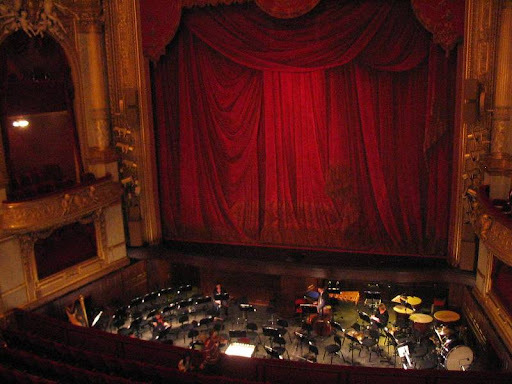
By the way, the leading singer, or Prima Donna (as they call Irene), are always sopranos. And the same goes for Irene Adler, all of her songs were written to highlight her soprano voice, like in 大作戦ーDaisakusen or her song with Ms. Hudson
An example from a song that I was reminded of when listening to Cecile!Irene. Of course there are many other songs we can talk about, this is just one of the examples.
Obviously, Irene's song aren't entirely like classical opera songs. They were all arranged to both highlight the opera feature, but also to suit the form of the musical and all the while showing Irene's elegant and gracious manners of a prima donna, and also showing her playful side especially during her duet with Sherlock.
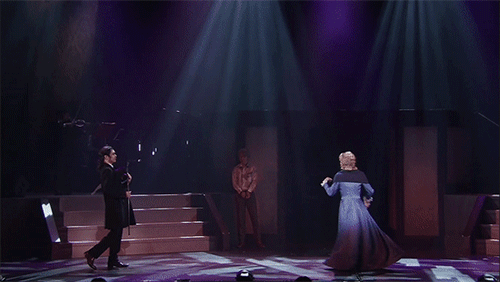
YAMI NO OPERA - DON GIOVANNI BEHIND THE CURTAIN
To understand Don Giovanni references, it's essential to understand the story behind the original opera by Mozart. That being said, the actual plot of the story is quite long and contains so many details it's almost impossible to fit all of them into one post while also comparing them with the one in Morimyu, so this is a link to a more detailed synopsis of the opera. Or you can also read more on wiki. I'll just give some basic details that are referenced and discussed in this post.
Overall impression: This opera revolves around a playboy that flirts with women, but lacking in loyalty and commitment to keep any of his promises to them. By the end of the play, after all the sin he has committed, Don Giovanni is engulfed in hell's fire, and punished for his sin. It is very much similar to the story in Morimyu, nobles relying on their wealth and status and have the freedom to do anything as they want, without having to worry about having to bear the consequence. Because of the difference in power and status, it is almost impossible to punish all of them, therefore having a need of a "demon" to punish them with powers that no human have - the role of Moriarty gang within the play.

In this arc, Liam is "directing" a play that is inspired by Don Giovanni. His audience is Irene Adler (and of course us who is watching the entire thing), and the main character is Lorinson who ends up being punished for his crime.
Mozart's Don Giovanni is being performed on stage, but at the same time Liam's "Don Giovanni" happens, in the back stage. What we are watching as the main stage is actually the "back stage" of the real story.
In the original play, Don Giovanni was a playboy that flirts with many women. At the beginning of the play, he flirts with a woman called Donna Anna, and her father tried to defend his daughter. They got involved in a duel and Don Giovanni killed the man. Donna Anna mourns and wish to avenger her father.
In Morimyu, the story of Lord Lorinson (pardon me for not knowing both the translation of his title and his name) is added in spite of the original plot in the manga.
As far as my Japanese comprehension goes, the story is that Lord Lorinson is also one that uses his status to abduct other women to his pleasure, and ends up treating them poorly.
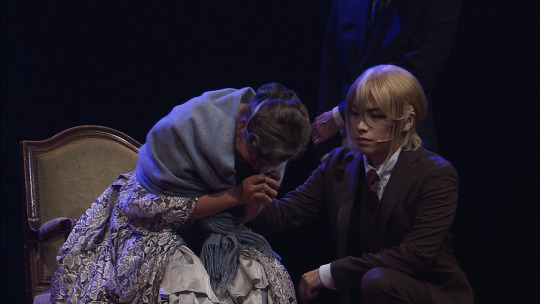
At one point, a woman came to the Lord of Crime, saying that her daughter has been murdered by the noble and mourns her. She wishes for revenge, and Liam proceed to do so.
Don Giovanni - Act I Finale
During Moran and Louis' fight with Raymond(?), in the section behind the stage we can see the opera theatre with the Finale song going on. The ensemble is still singing as the fight goes on behind them.

youtube
In the Finale of Act 1 here, the section that was insert into Morimyu was rather short, and was meant for a dramatic effect than actually showing what's happening in the original opera anyway. But anyway, we can see that as the fight proceeds, the curtain behind also slowly closes, ending the first Act of the opera.
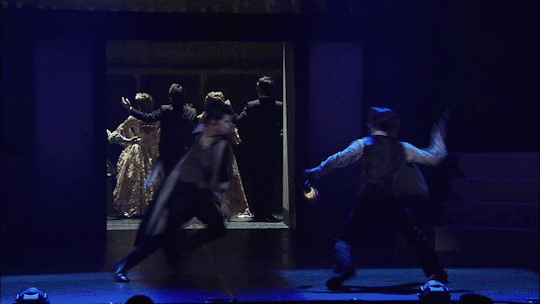
It's clearer here. We can see that as they are fighting there is an entire opera going on at the back. The fact that the ensemble has their back to the audience emphasises how everything we're seeing are all in the backstage, but at the same time it proceeds alongside with all the events in the "mainstage". It's quite a powerful image.
At one point in the opera, Don Giovanni attends a party where he met one of his previous lovers that he betrayed. Then there's some talking and such and more betrayal, and somehow he then decides that he would also flirt with his ex's maid.
There isn't much that I have to say with this reference in the play, only that it is actually Fred disguising as a maid for the purpose of carrying out the plan and scared the sh*t out of Lorinson lol
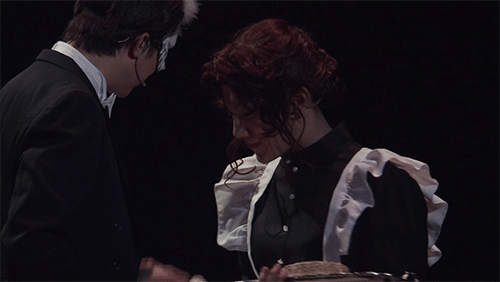
I couldn't catch all the details from their conversation, but apparently Fred did some kind of stand-in again as the victim who was murdered by Lorinson, also to provoke him and lead him into Liam's trap?
At the end of the opera, Don Giovanni was cornered by the 'devil', drowning him in the flames of hell. However before that happens, the women that Don Giovanni once flirted with (as well as Donna Anna whose father was murdered by Don Giovanni) gathered, chasing after Leporello - Don Giovanni's servant - who exposed him of his guilts and sins.
The song that the women sung in this scene is "Ah, dov'e il perfido?", and there is a very small section at the end of the song that was kind of re-arranged and added to Morimyu.
In Morimyu, this is the scene when Lorinson is exposed of what he is done, after that being "punished" by the devil. There is also a scene in the play when Liam mentions 地獄の炎 - Jigoku no Hono (The Flames of Hell) which is a direct reference from the original Don Giovanni. In fact, what he has been telling Lorinson is the story of Don Giovanni and how he ends up being punished - only that when Lorinson realised that, it's already too late.
(A reference from the song in the original play, the section that is used in Morimyu is actually quite short, only starting from around 5:40 within the song in this video)
youtube
In Yami no Opera, the song is arranged with Liam's part of the melody above the entire harmony. So it is indeed a proper opera that "Liam" has based on re-arranged to carry out his plan.
While Don Giovanni is happening on stage, there is also another "Don Giovanni" being punished by the devil - Lorinson. We hear part of the original song from the ensemble in the background, and also Liam's version of the punishment along with Lorinson's struggle. And at the same time the ensemble does seem to be focusing on "Don Giovanni" - all of them looking towards Liam's and Lorinson's position. A really impressive scene.

And after that very short section, the play goes on, returning their focus back to Irene Adler and Albert's conversation. There is no "Flames of Hell" erupting in any ways except for Liam's really strong section of the Yami no Opera song. And there's no need for it, I think, as Lorinson has never been the real protagonist like Don Giovanni. Liam only made him a temporary "protagonist" and not solely for the purpose of exposing him, but only as a mean to show Irene the true identity of the Lord of Crime. So there is no point making it more dramatic than it already is.
So...
That's pretty much all that I have to say about Don Giovanni and opera's reference, I think?
Well another thing, maybe, is how much I love the instrumental arrangement for violin and piano in Morimyu. They don't have the privilege of having an entire orchestra, but instead they did as much as they could for the instruments so that they recreate the original opera vibe as well as they possibly can. And the result is, just, extraordinary.
Anyhow, I've heard many of my friends comparing the songs from Op. 2 and Op. 3, seeing that Op. 3 has more of a "flow" in between the songs as all of them were written with harmony such that they have a certain connection to each other.
Not that Op. 2 doesn't do the same thing. However the second Opus does feel more separated, I think, since the music in the 3 different arcs are much more different. For instance the Baskerville arc has a "hunting" vibe to it, describing Moriarty gang's plan to bring down the nobles' game of hurting children, while the final Scandal arc revolves around an opera singer and mostly happens within a masquerade ball. So there is a big difference between the scenes, and obviously a big difference in the music brought to them as well.
Aaaand, that's pretty much all the details I've picked up (and remembered lol) up to this point.
Anyway, I've been watching and re-watching all 3 Opus of Morimyu many times, each time firguring out something else that I haven't noticed before. So if I end up realising some other details within this arc, maybe I'll come back and add to this post.
Thank you for reading ヽ(・∀・)ノ
Also, thank you @rikaaki for these beautiful gifs(☆▽☆)
53 notes
·
View notes
Note
[🗡️] HELLO IT'S ME AGAIN maybe I'll just talk here in your ask about the musical, I get few people to talk about it on twitter. Anyways, did you remember that one song from Op1 that Louis sang to William in the Noahtic Arc? When William suddenly talked about his 'Ego', I instantly remembered Baskerville Arc because that's where he also mentioned it in the manga.. And come to think about it, it was supposed to be on Op2, but either way, it's still super great because Louis got 2 songs AAAAHHH <3
HELLOOO Thank you for coming back for more spazzes. <3
YESSSS When I watched Op1 for the first time I also wondered why that scene was happening there. This is just my speculation, but my guess is they included it in Op1 because they thought it would be their only chance to do it. That in the beginning, they weren’t sure if we would have the Op 2, 3, and 4 that we have now. You know how some series put out a “feeler”, to see if it’ll gain audience?? Maybe Op1 was something like that.
BUT YEAH I’m pretty happy Louis has two songs. <3 I’m really hoping he gets a solo, or maybe a duet with Fred, for when he’s thinking about saving William. :(((( Idk if it’ll happen in Morimyu 4 (Or Morimyu 5???? Idk). But I really hope he gets to showcase that wonderful voice of his hngngng
There’s a part in “Chikara naki monotachi wo” that always gives me the chills bec of how low Ikkei’s voice goes. hgngngngnng It’s so hot (/o\)
ANYWAYS. Thank you for the Louis spazzzz. I love Louis. There’s a reason why he’s my profile pic. LOL
- Miso
5 notes
·
View notes
Text
Cast pages uploaded!
Today’s update isn’t about lyrics, but about cast information! I gathered the casts’ Twitter and Instagram profiles, blogs, company profiles, and Wikipedia (JP) pages into one page! Well, two pages. One for main characters and another for the rest of the cast, ensemble included!
You can show your support by following them. (That said, follow the MoriMyu official twitter as well!) Plus, they all posted adorable pictures from Op.3. For example, this lovely Durham family picture that Shougo (William) RT’d.

Happy browsing!
20 notes
·
View notes
Text
Uhm... what a day?
Okay so I totally forgot that this blog exists.
The main purpose I had for this blog was mostly for Morimyu/Morisute anyways, and with all the current things happening and me not coming back to Yuumori at all, so I guess I won't be doing much, for now.
Note: This post probably does not make a lot of sense, just mostly me rambling on.
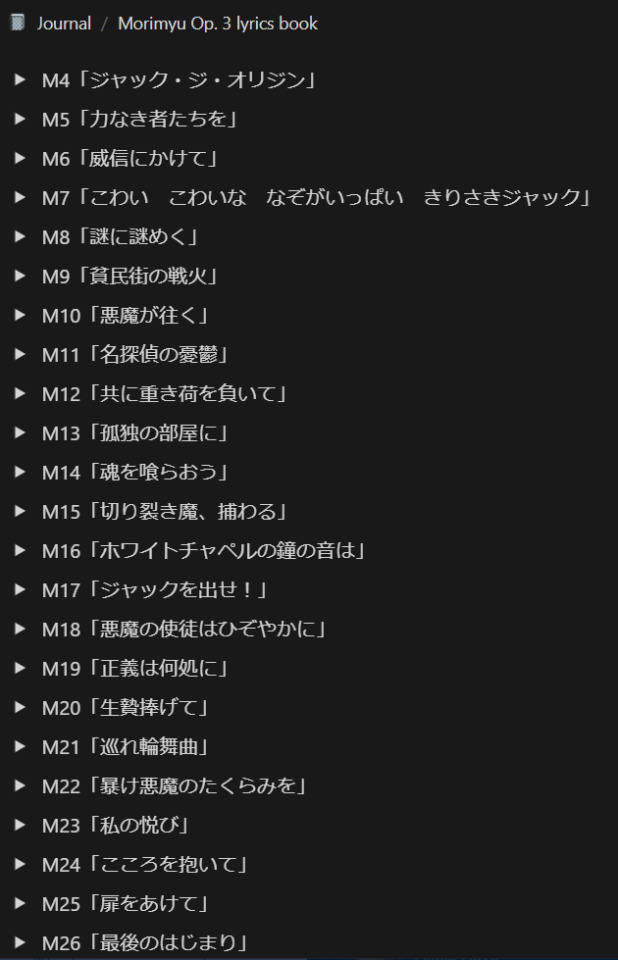
My other project of doing covers for Morimyu song (which recently changed to "transcribing all my fav songs into piano sheets and God knows when I will start practicing") obviously faces the same problem - forgotten. And coming back to everything after a while both feels strange + give a new refreshed interest. I don't know about the "energy to continue with it" part.
And then there is the sub for Op. 3 that I annoyed my friends for so long just rambling on about the kanji and how they use metaphors (thanks to my broken Japanese I don't know if half of what I said even made any sense).
Well I got the BD for Op. 3 from ages ago, and I only checked them, like, since yesterday. But went through all the lyrics and, once again, there's the so interesting pattern that the producers were making.
Well this time around when I went back to the lyrics I was suddenly more interested in how Milverton's parts went. The harmony, and the lyrics, and the metaphors they had in it. Maybe it's coz Op.4 where Milverton gets to shine, or it's just that I've been too focused on analysing SherLiam and Morigang the first time round so now everything else seem new.
I did make a lot of plans for things related to Morimyu, now that I think about it?
Again, this is just me rambling on in a rare occasion when I remember that one of my blogs exists. I don't know what the meaning of this post is anyways, so I'll just leave it here.
Not everything makes sense all the time, anyways.
5 notes
·
View notes